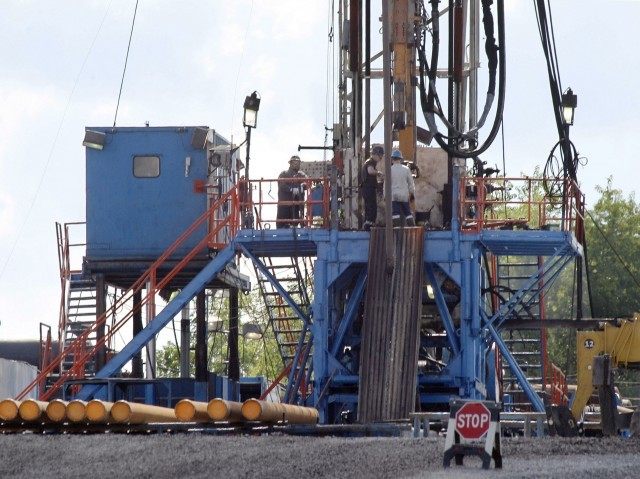WASHINGTON (AP) — The Obama administration said Friday it is requiring companies that drill for oil and natural gas on federal lands to disclose chemicals used in hydraulic fracturing operations.
A rule to take effect in June also updates requirements for well construction and disposal of water and other fluids used in fracking, a drilling method that has prompted an ongoing boom in natural gas production.
The rule has been under consideration for more than three years, drawing criticism from the oil and gas industry and environmental groups. The industry fears the regulation could hinder the drilling boom, while some environmental groups worry that it could allow unsafe drilling techniques to pollute groundwater.
The final rule hews closely to a draft that has lingered since the Obama administration proposed it in May 2013. The rule relies on an online database used by at least 16 states to track the chemicals used in fracking operations. The website, FracFocus.org, was formed by industry and intergovernmental groups in 2011 and allows users to gather well-specific data on tens of thousands of drilling sites across the country.
Companies will have to disclose the chemicals they use within 30 days of the fracking operation.
Interior Secretary Sally Jewell said the rule will allow for continued responsible development of federal oil and gas resources on millions of acres of public lands while assuring the public that “transparent and effective safety and environmental protections are in place.”
Jewell, who worked on fracking operations in Oklahoma long before joining the government in 2013, said decades-old federal regulations have failed to keep pace with modern technological advances.
“I’ve personally fracked wells, so I understand the risk as well as the reward,” Jewell said. “We owe it to our kids to get this right.”
Fracking involves pumping huge volumes of water, sand and chemicals underground to split open rocks to allow oil and gas to flow. Improved technology has allowed energy companies to gain access to huge stores of natural gas underneath states from Wyoming to New York but has also raised widespread concerns about alleged groundwater contamination and even earthquakes.
While the new rule only applies to federal land – which makes up just one-tenth of natural gas drilling in the United States – the Obama administration is hoping the rule will serve as a model and set a new standard for hydraulic fracturing that states and other regulators will follow.
Brian Deese, a senior adviser to President Barack Obama, said the rules for public lands could serve as a template that the oil and gas industry could adopt to help address the public’s concern about the health and safety of fracking.
“Ultimately, this is an issue that is going to be decided in state capitals and localities as well as with the industry,” he said.
The Interior Department estimated the cost of complying with the rule would be less than one-fourth of 1 percent of the cost to drill a well.
The new rule drew immediate criticism from groups close to the energy industry, which warned it could disrupt the yearslong energy boom in the U.S.
“The Obama administration’s hydraulic fracturing rule is a solution in search of a problem,” said Thomas Pyle, president of the pro-industry Institute for Energy Research.
The League of Conservation Voters called the bill an important step forward to regulate fracking.
Even so, the group was disappointed with the continued reliance on FracFocus, which a spokeswoman described as an industry-run website.
“While this proposal has improved from previous versions, it represents a missed opportunity to set a high bar for protections that would truly increase transparency and reduce the impacts (of fracking) to our air, water and public lands,” said spokeswoman Madeleine Foote.
The rule will make the Interior Department’s Bureau of Land Management the largest customer of FracFocus, a website that has taken on increasing prominence in recent years as it collects data on drilling sites. Nearly 95,000 wells nationwide are registered with FracFocus, which is managed by the Ground Water Protection Council and Interstate Oil and Gas Compact Commission. Both groups are based in Oklahoma. The groundwater council is a nonprofit organization while the oil and gas commission is a collection of state officials from energy-producing states.
Jewell said that BLM will have representation on FracFocus’ board, adding that the group has taken steps to improve its platform, including adopting a new format that allows data to be automatically read by computers. “We feel like we’ve got an appropriate seat at the table and they’re listening to input to address the concerns that were initially raised” when the site was first suggested for federal use two years ago, Jewell said.
Jewell acknowledged that congressional Republicans are likely to mount an effort to block the rule, but she predicted the rule would survive because the industry recognizes that sensible regulation of fracking is appropriate.
“We expect that these rules will stick,” Jewell said.
Follow Matthew Daly: http://twitter.com/MathewDalyWDC
Follow Josh Lederman: http://twitter.com/joshledermanAP

COMMENTS
Please let us know if you're having issues with commenting.